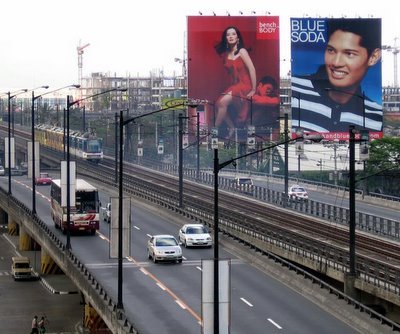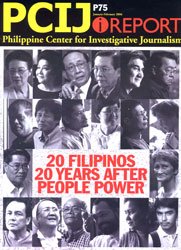
Romeo J. Intengan, SJ, is a man who embodies many seeming contradictions. He is a priest and a doctor who supported the need for armed struggle in the 1970s. He is a former political detainee who had to flee the country in 1980, returned after the 1986 Edsa revolution, and is now in a position to recommend the abolition of the Intelligence Service of the Armed Forces of the Philippines (ISAFP).
If you'd like to know more about Intengan, please buy the latest issue of
iReport. You may also listen to excerpts of my
interview (21.2 MB) with Intengan through the
PCIJ Channel.
Due to space limitations, the following paragraphs did not make it into the latest issue of
iReport. Here, Intengan talks about women, homosexual priests and the relationship between population growth and poverty.
Romeo J. Intengan
by Vernon R. Totanes
Archie, Intengan’s nickname, is short for archbishop—the title bestowed on him by his pre-med classmates in Iloilo after he made a pronouncement regarding their less than exemplary behavior. It is unlikely that Intengan will ever become Archbishop of Manila—or even be ordained bishop because Jesuits are not supposed to seek or accept such appointments—but many would probably welcome an archbishop who shares Intengan’s views. He does, however, make it clear that as a "Catholic Christian, Jesuit, and social-democratic Filipino," he speaks for no one but himself.
While Intengan believes that the Church hierarchy is exercising the right kind of leadership in the current political impasse, he does have some doubt about the Church’s capacity to shepherd its flock in the near future. He speaks, for example, of the dearth of priests and asks, "If the people of God are entitled to the sacraments, especially the Eucharist and baptism, where are the priests, where are the pastors? If they are not there, then probably the way the Church understands ministry and forms ministers has to be changed."
It may be time, according to Intengan, to seriously consider the ordination of women. He says, "Right now, the attitude in much of the Church is to shut out the [possibility of ordaining women] as a non-issue, not to be talked about." He asserts that a serious discussion is needed, "if only to reiterate the policy later on." After all, he adds, "Women do more than half the work in the Church, but they are underrepresented in decision-making in the Church."
With regard to the Vatican’s position on homosexual priests, which seems to be hardening, Intengan points out that outstanding priests are not necessarily heterosexual, that problematic priests who prey on people are not necessarily homosexual. As a former provincial superior of the Society of Jesus, Intengan believes that prospective seminarians should not be evaluated on the basis of their sexual orientation, but on "their psychological and spiritual health, and their motivation to serve God."
When it comes to sexual reproduction, it must be noted that Intengan once wrote an
article that asked whether Filipinos are poor because they are predominantly Catholic—but did not mention the word "population" even once. He now observes that although poverty in this country is caused largely by poor governance, "Large family size is also a possible cause of worsening poverty." The impact of Church teaching and the combative stance of many Church leaders on contraception is that, "It may have deterred our legislators and Executive [Department] from crafting a comprehensive national program on responsible parenthood and population policy." He cautions, however, against purely technical fixes—like the distribution of condoms—which is what many bishops fear. "There’s a defect," he says, "on both sides."
Category:
Religion








